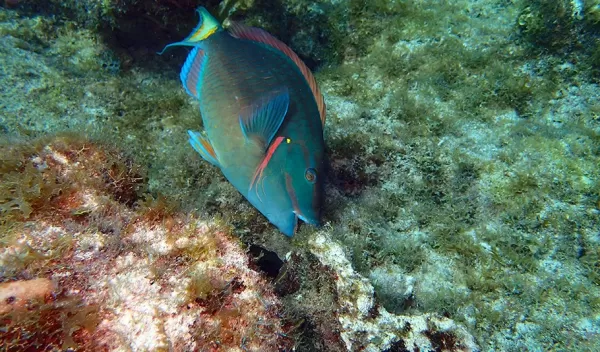
Large 'herbivores of the sea' keep coral reefs healthy
Selective fishing can disrupt the delicate balance between corals and algae in embattled Caribbean coral reefs. Removing large parrotfish, which graze on algae the way large land mammals graze on grasses, can allow the algae to overtake the corals, with potentially dire consequences for reef health.
New research suggests that fishing practices that maintain a healthy size distribution of parrotfish could help protect reefs that are already facing declines due to climate change.
A paper describing the NSF-funded research by scientists at Penn State and the University of California, Santa Barbara appears in the journal Ecological Monographs.
"Coral reefs are incredibly beautiful and intrinsically valuable, but they also protect thousands of miles of coastline and provide habitat for astonishing biodiversity that is the major source of protein for nearly a billion people worldwide," said Andrew Shantz of Penn State, first author of the paper. "Understanding how fishing impacts coral ecosystems will help us protect this valuable resource."
The researchers used survey data on parrotfish populations from 282 sites across the Caribbean and compared these sites to protected reefs in the Florida Keys to assess how parrotfish populations are impacted by fishing. The researchers found that the biomass—the total mass of parrotfish in a region—was not impacted by fishing because many more small parrotfish are able to occupy a region as fishing selectively removes large parrotfish.
However, said Shantz, experiments showed "that by excluding large parrotfish, the algae grew four times faster. By excluding both large and medium parrotfish, the algae grew ten times faster. So even though fishing does not reduce the biomass of the fish, it's the larger fish that keep the algae at bay."
In addition to Shantz, the research team includes Mark Ladd and Deron Burkepile of UC Santa Barbara.
"This study reveals the importance of large grazing fish in maintaining Caribbean coral reefs," says Dan Thornhill, a program director in NSF's Division of Ocean Sciences. "Many reefs have abundant herbivores, but it takes more than just herbivore biomass to keep reefs from declining into algae fields."


